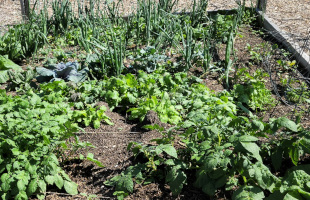
Ever plant a garden and get way more produce than you can use? What in the world possessed you to plant the entire packet of squash seeds, cucumber seeds, or beans? Your friends are begging you not to give them any more vegetables and still they come. Now what?
Donate to Food Pantries
The Ampleharvest.org Campaign can help. This is an organization that networks with food banks and gardeners. You go to their website and put in your zip code, and they give you a list of food pantries that would love to have your excess produce.
Being Hungry Is Common
Before the pandemic, one in six Americans currently worries about where their next meal is going to come from. Now things are worse. Many of these people are children, who especially need nutritious meals to grow properly. Food pantries around the country try to help by providing emergency supplies of food.
Food Banks Send Canned Food
However, they get their supplies from regional food banks in periodic deliveries. The only fruits and vegetables they see are in a can. Because canned fruits are often in sugar syrup that is bad for diabetics, and canned vegetables are often in salty water that is bad for people with high blood pressure, heart disease, and other health problems, this is far from ideal.
Welcome Produce
Most food banks welcome produce. It goes quickly because clients snatch it up, so refrigeration is not usually an issue. Instead of composting or otherwise wasting the excess produce you grow, check with Ampleharvest.org and see if you can give it to someone who needs it.
Who is this group? Ampleharvest.org, Inc. is a 501 c 3 organization. From their website:
AmpleHarvest.org has received support and backing from Google Inc., the U.S. Department of Agriculture, Rotary Int’l, VFW, the National Gardening Association, Garden Writers of America as well as numerous faith organizations. It is available to food pantries and gardeners at no charge.
I would a lot rather donate my excess produce to a food pantry near me than have it go to waste. Why not try this and see if there are people near you who are hungry for fresh produce, too?

Want to learn to garden? My first attempt at gardening ended up in failure. The weeds took over and squeezed the vegetables out. I was very frustrated by this waste of good seed, time, and money. So I became a master gardener and spent a lot of time helping other people avoid or overcome problems in their garden.
In order to help others garden successfully, I have written a book, Vegetable Gardening from the Ground Up, available in an ebook or a paperback from Amazon. It is also in Kindle Unlimited.


If you are new to vegetable gardening, there are certain things you must know before you start out. Vegetable gardening is not rocket science, and once you have got the basics right it is extremely simple to do. So what are some of the best tips for how to garden vegetables.
Well, I offer an book called Preparing a Vegetable Garden From The Ground Up that explains just that. It is available as an ebook or print book from Amazon.com.
If you know of a food pantry in your community, urge them to register at AmpleHarvest.org so they can receive fresh locally grown food for free.
Here at DollarSeed, we are dedicated to help feed the hungry. All of our fresh vegetable seeds that are left over at the end of the each growing season are donated to pantry growers. We recently sent a care package of this year’s seed to a group in Denton, Ohio who are transforming an old community garden into a pantry garden. We are also working with Green-Racine’s LotsToPlots, to help them get their project under way in Wisconsin. LotsToPlots is starting with selling fresh herbs to finance their program, with all proceeds going to developing vacant lots to feed their needy. Each plot will then be maintained by the local kids, to teach them both gardening and community service. Come see what makes us different, while helping you save your hard earned money.
http://dollarseed.com/catalog/
this is a great idea – I always end up planting too much so i don’t waste the seed
The government pays farmers not to grow wheat and corn. Other food crops are encouraged.
Hi Stephanie,
Sorry for the lateness of my comment (I’ve only just come across your blog) but I wanted to say “Thank you!” for posting this superb article.
Personally, I have been on both sides of the spectrum–as a child growing up my parents were not wealthy and we often had to rely on a food bank in order to eat. I can testify that one gets tired of peanut butter, tuna, and macaroni and cheese very quickly! We didn’t see fresh food much at all, and it was very hard–so I applaud you for bringing this sad issue to so many readers’ attention.
As an adult, I’ve had the fortune to be able to live in a place where I can have my own garden and grow all the fresh produce I want. Each year I save many seeds from the vegetables I’ve grown that year and dry them to use for next year’s planting. I’m also involved in a Heritage Seed program that encourages saving seeds over many generations–as a result I have several specimens of tomato and corn that most people do not know exist, and in fact, have almost died out from a lack of seed saving and large corporations encouraging buying new seed or creating sterile seeds.
I’m also glad to hear about AmpleHarvest, but I do not live in the states–are you aware of any such program for Canadians? I usually give my produce to friends and neighbours (our local food banks and shelters won’t take locally grown or fresh produce on the basis that the don’t know its origins), but I’d really love to be able to give back in a bigger way.
Thanks again!
I am afraid I do not know of one in Canada. Your laws are different. Check with your department of agriculture and see if they know of such a program there.